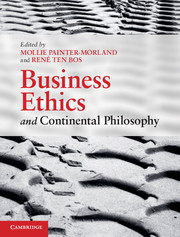Book contents
- Frontmatter
- Contents
- Figures
- Boxes
- Contributors
- Foreword
- Acknowledgements
- Introduction: critical crossings
- 1 Agency in corporations
- 2 Stakeholder theory
- 3 Organizational culture
- 4 Enron narrative
- 5 Moral decision-making
- 6 Organizational justice
- 7 Reward, incentive, and compensation
- 8 Leadership
- 9 Whistle-blowing
- 10 Marketing, bad faith, and responsibility
- 11 Corporate social responsibility
- 12 Corporate responsibility standards
- 13 Sustainability
- 14 Globalization
- Glossary
- Name index
- Subject index
- References
Introduction: critical crossings
Published online by Cambridge University Press: 05 June 2012
- Frontmatter
- Contents
- Figures
- Boxes
- Contributors
- Foreword
- Acknowledgements
- Introduction: critical crossings
- 1 Agency in corporations
- 2 Stakeholder theory
- 3 Organizational culture
- 4 Enron narrative
- 5 Moral decision-making
- 6 Organizational justice
- 7 Reward, incentive, and compensation
- 8 Leadership
- 9 Whistle-blowing
- 10 Marketing, bad faith, and responsibility
- 11 Corporate social responsibility
- 12 Corporate responsibility standards
- 13 Sustainability
- 14 Globalization
- Glossary
- Name index
- Subject index
- References
Summary
Why read this book?
Authors like to imagine that people read their books out of passion for the subject matter or at least out of a curiosity regarding the new perspectives that the text may yield. Years of teaching have, however, made this team of editors more realistic. This book was more likely assigned by your teacher, and bought with hard-earned money squeezed from an increasingly tight textbook budget. You are most likely opening it now because your teacher assigned the introduction for your first class meeting, or because you are eager, or anxious, or both, to know what will be expected of you in this course within the next few weeks. The other possibility is that you are a teacher yourself, trying to determine what your students should spend their money and time on. It is therefore pointless to convince you that this book is worth the money you or your students have spent and the time that all of you will devote to reading it over the next couple of weeks. We cannot convince you, even if we tried. Reading books is a uniquely personal activity. The journey that reading this book will take you on is shaped by who you are and by what you bring to the table in terms of questions, passions, and expectations. The best we can do is try to explain why we went to the trouble of putting this book together.
At face value, this book may look like a normal textbook. You will encounter facts, figures, tables, text boxes, learning goals, and all other things that one would expect from a decent textbook. Like many other business ethics textbooks, the material is interdisciplinary in nature. It aims to offer some philosophical perspectives on the business environment, and since it deals with the behaviour of systems and institutions, it draws on disciplines such as sociology and psychology as well. The global context in which businesses operate also requires the development of insight into political economy and cultural studies. The authors in this book therefore represent many different disciplines. They are also from different areas in the world. Some are philosophers, others are organizational theorists or business ethicists. They all share an interest in ethical issues about business and society.
- Type
- Chapter
- Information
- Business Ethics and Continental Philosophy , pp. 1 - 14Publisher: Cambridge University PressPrint publication year: 2011
References
- 1
- Cited by



